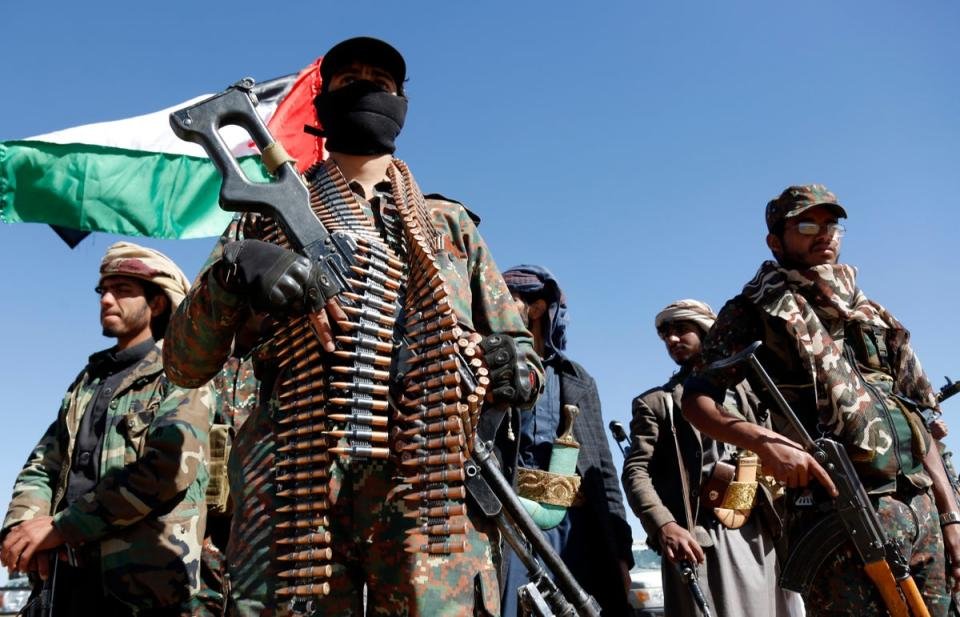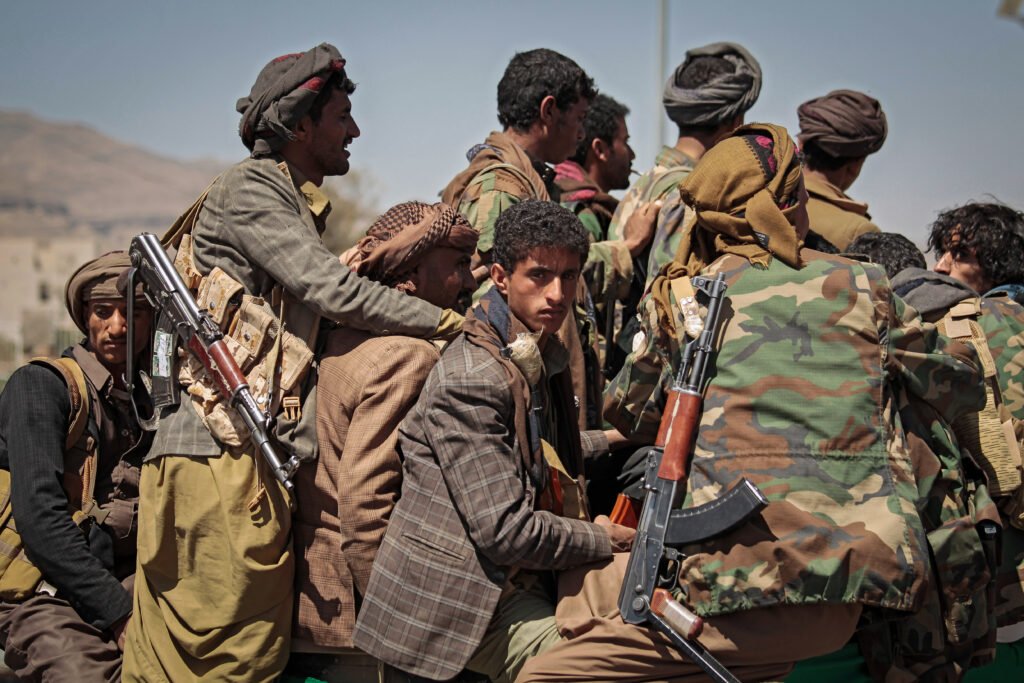In January, as Israel’s military campaign in Gaza intensified, Yemen’s Ansar Allah movement, known as the Houthis, launched drone and missile attacks targeting ships in the Red Sea. The stated goal was to disrupt trade linked to Israel, aiming to exact an economic toll for the atrocities in Gaza. The U.S. and UK responded swiftly with airstrikes on Houthi positions, pledging continued action unless these attacks ceased. Yet in Yemen, a country already scarred by years of civil war and foreign intervention, many Yemenis — even those opposed to the Houthis — view these actions with a surprising degree of support, seeing them as a defense of the Palestinian people.
Yemen’s Shared History with Palestine
Having worked in Aden, Yemen’s de facto southern capital, I’ve observed that the Palestinian struggle deeply resonates with Yemenis. Yemen itself remains split, with the south influenced by Sunni Gulf states and the north governed by the Iran-backed Houthis. Across these divisions, Yemenis frequently express an emotional kinship with Palestinians, seeing their cause as a symbol of resistance against oppression. For many, supporting Palestine has become a way to articulate their own hardships without directly revisiting the traumas inflicted by Yemen’s own conflicts.
This sympathy has deep roots in shared anti-colonial struggles. Like Palestinians, Yemenis have faced cycles of foreign intervention and control. This perspective was articulated by a Yemeni pharmacy student, who, when discussing the connection between Yemen and Palestine, emphasized the region’s Islamic history and shared cultural heritage. Reflecting on the Al-Aqsa Mosque in Jerusalem, he described it as a sacred site deeply tied to Islamic history and unity, a place from which “our Prophet Muhammad ascended to the heavens,” making its desecration by foreign powers especially painful for Muslims.
One common sentiment is that Yemen and Palestine are linked by a shared experience of war and suffering. “We feel the pain of others because we’ve endured it ourselves,” another contact told me, summarizing a sentiment that resonates widely.

Deep-Seated Support for Palestinian Struggle
Many Yemenis view Israel’s actions at Al-Aqsa and in Gaza as a brutal violation of humanity. A Yemeni who spent years in North America remarked that Yemeni solidarity with Palestine is driven by a profound religious commitment, “a duty to support our brothers in Palestine and free the Al-Aqsa Mosque from oppression.” For him, the Muslim community worldwide is like “a single body; when one part suffers, all suffer.” He also noted that Yemeni solidarity is not unique, referencing past movements where Muslims, from Afghanistan to Chechnya, took up arms in defense of their fellow Muslims under attack.
A young physician in Aden echoed this support but from a humanitarian perspective. Having worked in a children’s hospital, she recounted her interactions with Palestinian refugees in Yemen, which deepened her empathy for those enduring the ongoing conflict. “I am not speaking to you as an Arab, but from a human side,” she explained. “If someone fights against Palestinians, fighting back is only right.” She’s ready to provide medical help if the borders open, knowing firsthand the dire need for healthcare and resources in Gaza.

Shifting Allegiances: A South Yemeni Perspective
Remarkably, support for the Houthis’ Red Sea actions comes even from southern Yemenis who previously fought against them. These individuals acknowledge a lack of any state representation of their interests, and some even praise Houthi leader Abdul-Malik Badr al-Din al-Houthi for his stance against Israel. A young worker in Aden told me, “I respect this operation, and I applaud Abdul-Malik al-Houthi for defending Palestine. No other leaders have dared to confront Israel as he has.” When asked whether this meant he trusted the Houthis, he responded pragmatically: “They’re still our enemies and aligned with Iran, but in this case, their actions align with our shared interests.”
Such perspectives reveal the complex allegiances shaped by regional conflicts. While southern Yemenis appreciated Gulf Cooperation Council (GCC) support in expelling the Houthis from Aden, they simultaneously see the Houthis’ recent moves as a necessary stand. This sentiment reflects the broader Middle Eastern reality, where alliances are often formed out of necessity rather than genuine trust.
Growing Legitimacy for the Houthis
The Houthis are gaining broader legitimacy within Yemen, even in regions they do not control. Their symbolic support for Palestine has resonated with Yemenis, reinforcing their image as defenders of the oppressed. This growing legitimacy also extends beyond Yemen, finding support across parts of the Middle East and even within segments of the Western public disturbed by the humanitarian crisis in Gaza. Reflecting on the role of foreign powers in Yemen, a Yemeni law lecturer commented, “We have nothing left to lose after years of intervention aimed at destabilizing our state.” A naval blockade on northern Yemen, while showing signs of easing in peace talks between Saudi Arabia and the Houthis, has exacerbated a humanitarian crisis the UN has called one of the worst in modern history.

The suffering in Gaza has added urgency to calls for international aid, though both Yemen and Palestine face significant shortfalls in humanitarian support.
Enduring Trauma and International Oversight
For many Yemenis, the devastation they see in their cities serves as a daily reminder of the trauma faced by Palestinians. Ruins from Western-supplied bombs are visible throughout Aden and Sana’a, stark symbols of the consequences of foreign involvement in the region. Meanwhile, attempts by the U.S. to build a coalition against the Houthis are hindered by lukewarm support from Gulf allies like Saudi Arabia and the UAE, neither of whom is eager to engage in a conflict perceived as serving Israeli interests.
Saudi Arabia’s recent diplomatic progress with the Houthis suggests an evolving strategy. The kingdom appears inclined to invest in Yemen’s north, possibly using oil revenues to fund government salaries in Houthi-controlled regions. As the lead actor in Yemen’s conflict, Saudi Arabia seems unwilling to restart hostilities or participate in a war perceived to align more with Israeli interests than its own.
Western narratives often attribute Muslim-majority nations’ solidarity with Palestine solely to antisemitism. While rising antisemitism is indeed concerning, reducing Yemen’s response to such simplistic reasoning overlooks the complex history of colonialism, occupation, and foreign intervention that underpins Yemeni and broader Middle Eastern sentiments.
Yemenis, whether in Aden or Sana’a, need only look out their windows to see the ruins of bombed buildings. These sights offer a constant reminder of the realities Palestinians face in Gaza — and why Yemen’s solidarity with Palestine remains unyielding.

